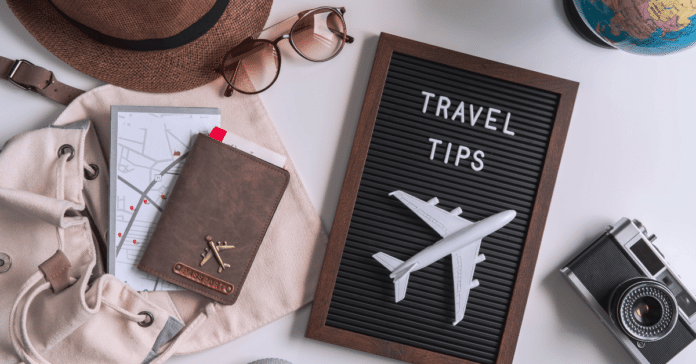Table of Contents
Planning Your Trip
Traveling is an exciting and fulfilling experience, but planning a trip can be daunting, especially for novice travelers. To help make the process easier, here are some essential tips for planning your trip.
Research Your Destination
Before embarking on your trip, it is essential to research your destination thoroughly. Find out about the climate, local attractions, and activities that you can enjoy. Look for any travel advisories or warnings that may affect your plans.
Determine Your Budget
One of the most crucial aspects of trip planning is determining your budget. Decide on how much money you are willing to spend on your trip and allocate it accordingly. Consider expenses such as airfare, accommodation, food, transportation, and activities. Be realistic about your budget and try to stick to it as much as possible.
Create an Itinerary
Having an itinerary is crucial to making the most of your trip. Make a list of the places you want to visit and the things you want to do. Plan your days according to your interests and preferences. Be flexible and allow some room for spontaneity. A well-planned itinerary can help you save time and make the most of your trip.
Make Necessary Reservations
Once you have your itinerary in place, start making reservations for your trip. Book your flights, accommodation, and any activities that require advance booking. Be sure to read the fine print and cancellation policies before making any reservations.
Prepare Travel Documents
Make sure to prepare all necessary travel documents such as passports, visas, and travel insurance. Check the expiration dates of your travel documents and renew them if necessary. Keep important documents such as your passport and travel insurance handy during your trip.
Packing Tips
Packing for a trip can be a daunting task, but with these packing tips, you can ensure that you have everything you need without overpacking.
Pack Light
Packing light is considered one of the most crucial tips when it comes to packing for a trip. Avoid packing unnecessary items that will only add weight to your luggage. Stick to the essentials and plan your outfits according to the weather and activities you have planned. Make sure to pack versatile clothing items that can be easily mixed and matched to create various outfits.
Organize Your Luggage
Organizing your luggage can save you time and make unpacking easier. To keep your clothes organized and compact, it is recommended to use packing cubes or compression bags. Remember to pack heavier items at the bottom of your luggage and place lighter items on top. Use the empty spaces in your luggage, such as shoes or the inside of hats, to pack smaller items.
Bring Essential Items
Be sure to bring essential items such as medication, toiletries, and important documents in your carry-on luggage. Pack a travel-sized first aid kit, reusable water bottle, and a portable charger for your electronic devices. Avoid packing items that are easily replaceable, such as shampoo or toothpaste.
Dress Appropriately for the Climate
It is essential to check the weather forecast for your destination and pack the necessary clothing items accordingly. Dress in layers if you’re visiting a destination with fluctuating temperatures. For trips to tropical destinations, it is advisable to pack lightweight and breathable clothing to stay comfortable in the warm and humid weather.
Staying Safe and Healthy
Staying safe and healthy while traveling is important for enjoying your trip to the fullest. Follow these tips to ensure that you stay safe and healthy on your travels.
Take Necessary Vaccinations and Medications
Before you travel, research any necessary vaccinations or medications required for your destination. Consult with your doctor or a travel clinic to ensure that you have the necessary immunizations and prescriptions. Be sure to pack any necessary medications in your carry-on luggage, and keep a copy of your prescriptions with you.
Purchase Travel Insurance
When traveling, having travel insurance can provide a sense of security and peace of mind. Consider purchasing travel insurance that covers emergency medical expenses, trip cancellation, and lost or stolen luggage. It’s important to carefully review the details of your travel insurance policy and make sure you understand what is and isn’t covered.
Be Aware of Your Surroundings
Stay aware of your surroundings and take precautions to stay safe. Avoid carrying large amounts of cash or displaying expensive jewelry or electronics. Stay in well-lit and populated areas, and exercise caution when interacting with strangers. Keep a close eye on your belongings, especially in crowded areas such as public transportation or tourist sites.
Keep Important Information and Emergency Contacts Handy
Keep important information and emergency contacts handy in case of an emergency. This includes your passport and visa information, travel itinerary, and contact information for your hotel or accommodations. Keep a copy of these documents in a safe place, such as in your carry-on luggage or in a secure digital format.
Transportation and Accommodation
One of the biggest expenses while traveling is transportation and accommodation. Here are some tips to help you save money while still enjoying a comfortable journey.
Choose the Right Mode of Transportation:
Depending on your destination, you may have various transportation options, such as plane, train, bus, or rental car. Research the options and compare prices to choose the most cost-effective and efficient way to get around.
Book Accommodation in Advance:
Booking accommodation in advance can save you money and help you avoid the stress of finding a place to stay last minute. Consider using hotel booking sites or Airbnb to find affordable options.
Be Aware of Local Transportation Options:
Once you arrive at your destination, be aware of local transportation options such as buses, subways, or taxis. Public transportation is often cheaper than taking a taxi or renting a car, so take advantage of it whenever possible.
Money-Saving Tips
- Look for Travel Deals and Discounts: Keep an eye out for travel deals and discounts from airlines, hotels, and travel booking sites. Sign up for newsletters or follow travel websites on social media to stay up to date on the latest promotions.
- Consider Alternative Accommodations: Consider alternative accommodations such as hostels, camping, or vacation rentals. These options can be significantly cheaper than traditional hotels and provide a unique experience.
- Use Public Transportation: As mentioned earlier, public transportation is often a cost-effective option for getting around. It’s also a great way to explore the local area and get a feel for the culture.
- Eat Local and Avoid Tourist Traps: Eating at local restaurants and avoiding tourist traps can help you save money while also giving you an authentic taste of the local cuisine. Ask locals for recommendations on where to eat and try to avoid eating near popular tourist attractions, as these places tend to be more expensive.
Cultural Etiquette
One of the most exciting parts of traveling is experiencing different cultures and customs. However, it’s important to be mindful and respectful of the traditions and social norms of the places you visit. Here are some tips for practicing cultural etiquette while traveling.
Learn about the Local Culture and Customs
Before you depart on your trip, take some time to research the culture and customs of your destination. This can help you understand the local people and their way of life. Reading books, watching documentaries or movies, or talking to locals or people who have traveled to that place before can be great resources.
Respect the Local Traditions and Laws
When visiting a new place, it’s important to respect the local traditions and laws. Be mindful of dress codes, customs, and traditions, and try to follow them as much as possible. Some cultures are more conservative than others, so it’s important to research and learn about these practices in advance.
Dress Appropriately in Public Places
As mentioned earlier, it’s important to dress appropriately in public places. Some cultures may require more conservative dress, especially when visiting religious or sacred sites. While traveling, it’s always a good idea to pack clothing that is versatile and can be easily layered to accommodate different temperatures and occasions.
Learn a Few Basic Phrases in the Local Language
It’s always a good idea to learn a few basic phrases in the local language. This can help you connect with locals, show respect for their culture, and navigate your way around the area. Simple phrases such as “hello,” “thank you,” and “excuse me” can go a long way in showing your willingness to learn and respect the local culture.
Conclusion
Practicing cultural etiquette while traveling can enhance your experience and help you connect with locals on a deeper level. By taking the time to learn about the culture, respecting local traditions and laws, dressing appropriately, and learning basic phrases in the local language, you can show respect for the people and the place you are visiting.






























